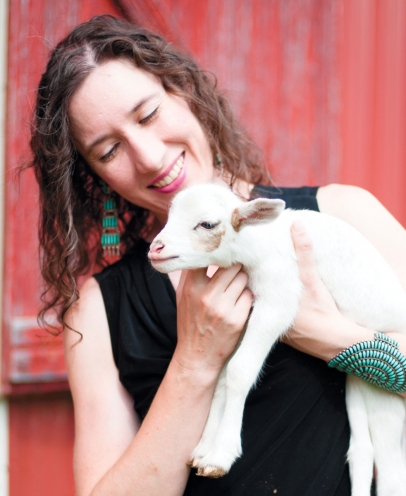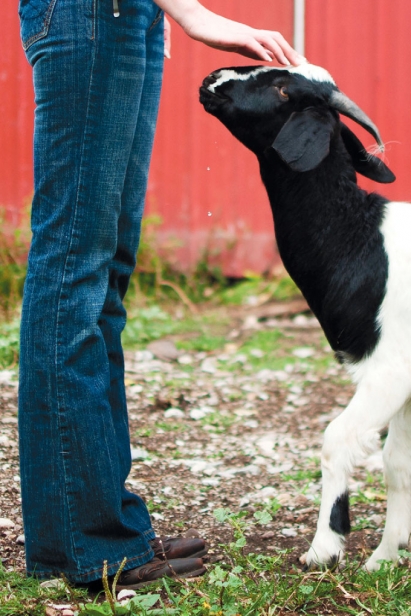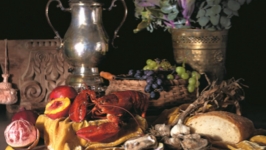At Harrison Farm, Central Ohio's Fearless Female Farmer, Katherine Harrison, Leads a Fifth-Generation Farm
Stepping onto Harrison Farm in Franklin County, just outside of Canal Winchester, the air drips with history, nostalgia and a tie to ancestral land.
Katherine Harrison, a vibrant 40-year-old woman, oversees the farm’s operation. The story of Harrison Farm is rooted in perseverance as Katherine has faced many trials in her quest to continue her family’s fifth-generation farming tradition. She has bravely soldiered on and today is a leader in not only our region’s farming community but in the small cadre of women farmers in our country who account for only 14% of principal farm operators nationwide.
Katherine is active in a number of political causes, and since 2011 she has served as a representative to the Ohio Farm Bureau Federation’s board as well as the Ohio Farm Bureau Foundation board.
Katherine operates Harrison Farm entirely on her own. She is single and, as the seasons of life have changed, all of those whom she has called family and shared the vast farmhouse with, including her grandparents and mother, have passed on.
“Most of the people I know who farm, they farm with their spouse, their parents, their children. I am here solo. But you make it work. If something is important to you, you figure it out,” she says while gazing at her pastures bursting with livestock.
On the day that I met Katherine, a bandana covered her head, concealing a gash that she had acquired the night before while in the barn tending to an immediate need of one of her goats. After hitting her head in the dark she phoned a friend to ask them to check on her in the morning. Despite the trials, Katherine is determined for the farm to succeed for another generation. “It’s exhausting, it’s overwhelming, but it’s the life I know,” she says.
Small Farms Bring Opportunity
Katherine tends to 60 goats, 30 sheep, 15 roosters and 80 chickens in pastures purchased by her great-grandfather. Ten cats, a donkey and a dog also call the farm home. Through direct marketing, she sells livestock meat and the eggs from her chickens to varied consumers in the region. Additional income is raised through her work as an independent event planner; on-farm events, such as an open farm series, yoga and an upcoming painting series; and through an etching business that she is working on getting off the ground.
“I truly believe communities need small farms. I believe in all kinds of agriculture. We need diversity, different opportunities and different markets. Small farms in a community provide green space and jobs. They provide a connection for people to understand that farming is not something that happens far away, it is part of our everyday life,” Katherine reflects.
Educated at the University of Richmond in Virginia, Katherine studied history and world religions. This training proved useful when she returned to the farm after college and helped her mother and her mother’s husband open and run an on-farm slaughterhouse, which catered to the growing Muslim community in Central Ohio searching for halal meat. Katherine’s family sold directly to consumers and to several ethnic markets in the region. After several years in operation, however, her mother fell sick with cancer and with her passing, so too did Katherine’s involvement in the business.
2015: A Year of Challenges
After the closing of the slaughterhouse, Katherine stayed on the farm to take care of her ailing grandmother, whom she described as a “spitfire.” Her grandmother died in 2015 at the age of 98. That year also brought a number of other personal challenges, including the death of a beloved mentor from brain cancer, a broken engagement to a man she loved and dreamed of building a life with, career challenges, as well as her own personal health scare. As she spent that winter in the old farmhouse listening to the walls echo with her ancestors’ dreams, she faced one decision: throw in the towel or fight her hardest to succeed.
“In a six-month period of time it felt like everything that could go wrong did. The tough part of going through a situation like that, especially being alone, is that you feel like the world is really against you,” Katherine says. “I decided that in moving forward I needed to do something that mattered to me and that made the world better. That gave me the courage to say, ‘I am throwing myself into this farm and if it fails, it’s going to fail spectacularly, but I am going to do everything in my power to make this farm work.’”
And working it is. With Katherine’s optimism and dedication the farm is growing in reach and her days are filled with not only daily farm life but with a number of civic engagements through her commitments with the farm bureau and her connections in the community.
Empowering Female Agriculturalists
Katherine is committed to serving as a mentor to up-and-coming agriculturalists. Each semester, she invites a number of students to intern with her, including high school student assistants, as well as college interns from The Ohio State University. Overwhelmingly, these youth have predominantly been women.
“Each semester, I give a lecture at Ohio State and I always mention that I offer on-farm internships. Generally, after the lecture, women approach me to learn more. I think because when you are a young woman and you’re in agriculture, though there are many women at Ohio State studying agriculture, it’s still a male-dominated industry. If you want to gain hands-on livestock skills and you are a young woman, it is very attractive to have a female to provide that mentorship,” Katherine explains.
Katherine’s interns help her with every aspect of farm life, from birthing and taking care of the livestock to assisting with marketing and outreach. Katherine also invites her interns to accompany her to events, enabling them to learn firsthand about farm policy and meet leaders in the agricultural community.
“As I reflect on my career, I understand what I want to leave for those who will come after me,” she says. “I want those young ladies to have the opportunity to sit on boards, lead policy initiatives, be invested in the farm community. I want them to be able to do it without facing some of the challenges that I have. They will have their own challenges, but being a woman in a male-dominated industry is a unique position and I want to leave a legacy that will enable more women to step up and take on leadership roles in agriculture.”
Throughout her career, Katherine has observed that many of the women that she encounters in the agricultural community have taken on supporting roles to their husbands. It’s natural for women to want to nurture and be caretakers, she says. Her unique position of forging ahead on her own, however, has given her a fresh perspective on empowered women in agriculture. And, she reflects, she has had the fortune of learning from several fantastic role models along the way.
“When I was first elected to the Ohio Farm Bureau board there were women on that board that impressed me and I wanted to be as capable as them. They were farmers themselves, they were educated, that was something that I wanted to obtain for myself,” Katherine explains. “Now, I want the women that come after me to have those same opportunities and to think of themselves as the next generation of strong female farmers.”
Forging a Brave New Future
Katherine’s greatest role model was her grandfather, whom she spent time with daily accompanying on chores around the farm. Her grandfather taught her that she could do anything, she says. She was not raised with the concept that there are separate realms of achievement for each gender. Her grandfather always told her that she could do whatever she set her mind to as long as she was persistent and persevered.
Katherine also learned from several resilient female figures in her family, including her mother and grandmother. One favorite family anecdote is of her great-grandmother saving a piano from a house fire. The piano, only one of two objects to make it out of the fire, sits in Katherine’s living room today. “I don’t know how she got that piano out of that house but it’s a reminder for me that each of us has huge reserves of strength inside of us that we do not even know about until called upon,” Katherine says.
Gazing at her pastures, with roosters crowing in the foreground and cats rubbing against her legs, Katherine recognizes her role as not only an agricultural leader in the female farming community but as a steward of the land that her ancestors cherished. In fearlessly operating Harrison Farm, she recognizes that through all of the challenges she is fortunate to have some of the best partners anyone could dream of.
“Those animals, I work for them and they work for me,” she says. “I tell them, we’re in this together”
Harrison Farm is located at 5218 Berger Rd. in Groveport. Katherine blogs about the farm’s adventures at harrisonfarm13.blogspot.com.







